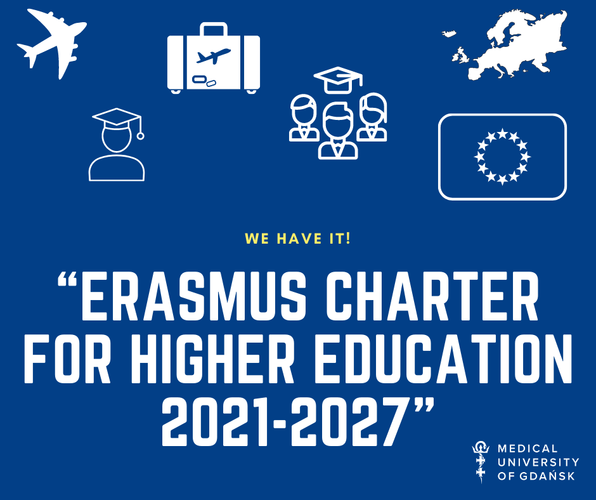Erasmus Charter for Higher Education 2021-2027 for the MUG
4.01.2021
By the decision of the European Commission of 22 December 2020, the Medical University of Gdańsk received Erasmus Charter for Higher Education 2021-2027. The document defines quality scope of the activities, that a given higher education institution should carry out under Erasmus +. Each entity from the countries participating in program, wishing to participate in projects, in the field of educational mobility of people or consisting in cooperation for innovation and exchange of good practices must have the Charter. Polish universities submitted a total of 265 applications – 32 in the “full” procedure and 233 in the “simplified” one. 261 applications were approved, including ours, which received 100/100 points.
Granting the Charter for the next 7 years is the result of efforts of the Department of Internationalization of the MUG. This success will enable MUG’s continued participation in the Erasmus+ program, and thus the achievement of goals such as maintaining the level of internationalization, developing mobility programs offered to students and employees of the University and providing more efficient digital mobility management tools. It is also important to intensify the activities of the unit supporting foreign students and employees (Welcome Point) and to increase the form of mixed mobility within the offered programs.
The expert evaluating the application of our University appreciated supporting the improvement of skills and intercultural competences of MUG’s employees, conducting activities aimed at increasing the level of internationalization through the mobility of the academic community, and also involving former Erasmus program participants as ambassadors.
MUG’s procedures for automatic granting of credits for learning outcomes achieved during the mobility period abroad/mixed mobility, the correct application of the learning agreements (including online) and the inclusion of relevant information on learning outcomes, workload and ratings have been recognized. The expert verifying the application additionally drew attention to a clear path of appeal in case full automatic recognition is not achieved. He also appreciated the provision of complete information on the grading system in the interinstitutional agreements and the transparency of the course catalog (ECTS). Another advantage of the MUG turned out to be the qualitative level of the program, its internal management structure and human resources involved in the implementation of planned activities, ensured by permanent structures of cooperation and communication. The new goals forpró the University include increasing the level of internationalization to a new percentage threshold, increasing the mobility of students and employees, improving practices regarding the recognition of learning outcomes and ensuring full transparency of procedures.
Archives
- Academic Year 2024/2025
- Academic Year 2023/2024
- Academic Year 2022/2023
- Academic Year 2021/2022
- Academic Year 2020/2021
- Academic Year 2019/2020
- Academic Year 2018/2019
- Academic Year 2017/2018
- Academic Year 2016/2017
- Academic Year 2015/2016
- Academic Year 2014/2015
- Academic Year 2013/2014
- Academic Year 2012/2013
